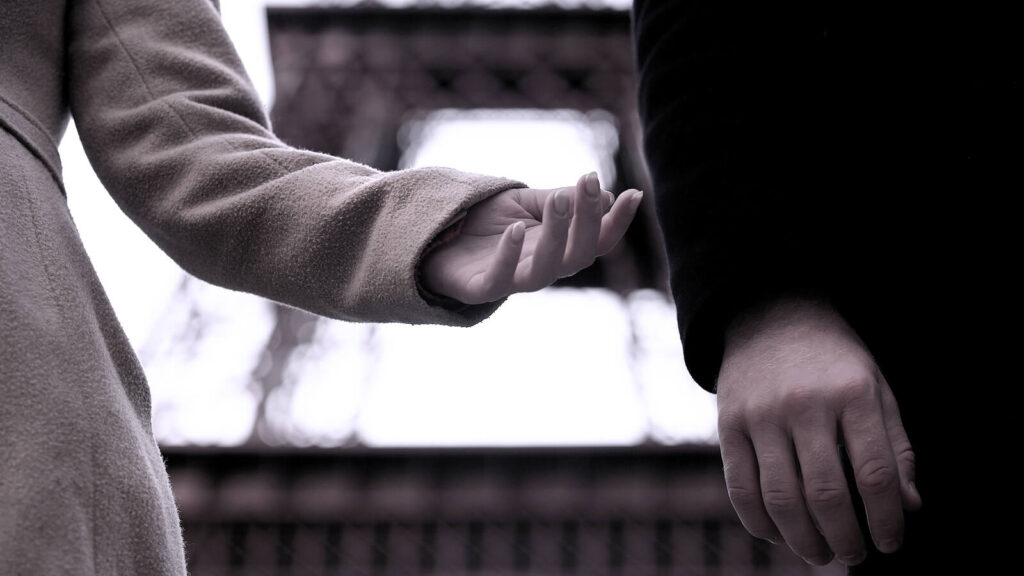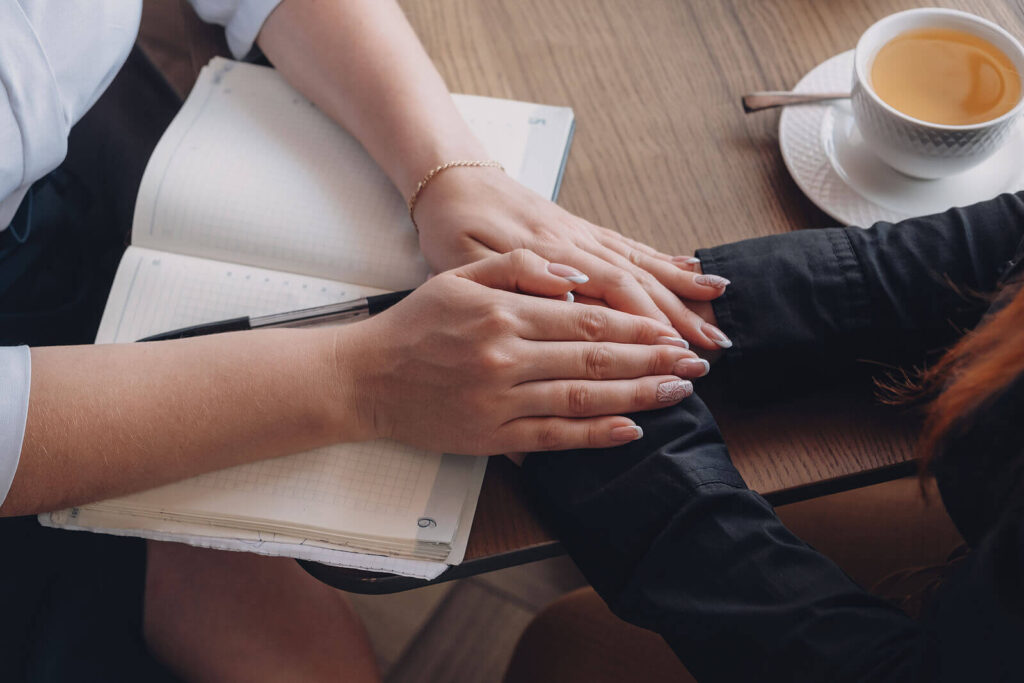Are you curious how to build connection in a relationship? Our disconnection from our nature makes us disconnect from whether it’s siblings, parents, our children, our friends, or our partners, and then the wider community of humanity and nature and the whole world.

Let’s Begin with our Neurobiology
So, it’s really important to understand how we work neurobiologically so that we can be more skillful in our relationships. The autonomic nervous system is constantly scanning the environment and our bodies for signs of safety. When it perceives danger, it sends a signal to the brain which triggers the fight-or-flight response.
The prefrontal cortex is the part of the brain that evolved last of the species, the most mature part of us that can stop and think and make deliberate decisions. So what happens if the answer is no, I don’t feel safe. If you lose what I call us consciousness, that prefrontal cortex, you lose the sense of the relationship of the whole. And it reverts to me, me, me, me, me. And you become an island, and that’s when the trouble starts in relationships and damages building a connection.
When we feel disconnected from others, it is because we are disconnected from ourselves. We are not able to be present with our own emotions and needs, so we cannot be present with the emotions and needs of others.
What is Relational Mindfulness?
This is where you build the muscles in that very heated moment of taking a breath, taking a break, or taking a walk around the block if you need to. Have a little chat with your inner child, do some breathing, do some meditation, and do some of those regulation techniques that we know from trauma. The goal is to begin centering yourself back into the wise adult part of you.
The truth is that when we’re triggered, we lose ourselves and we move into our trauma and we don’t move into what I call the wounded child part of us. We move into the adaptive child. I want to share a Gabor Mate saying it: rarely do you see the wound, what you see is the scar tissue. Tying this back into relationships, we rarely see the wounded child in the relationship. On the inside, we just want to be comforted and curl up into a ball to cry. Many people are operating as an adult with the wounded child hiding in the shadows.
This is where neurobiology comes into play.
When we’re in our fight-or-flight mode, the prefrontal cortex shuts down and we move into what’s called sympathetic dominant mode. This means that the part of the brain that’s responsible for fight-or-flight is now in charge, and it’s not looking out for danger. Our goal in relationships is to begin to be more observational, rational, mature, and deliberate. Often, people, have the notion of relationships take work, but we are not always clear on what that work is.
The work of relationships constantly means growing and learning so that we can move out of our automatic, reactive patterns, and into a more conscious way of being. When we can do this, we are then able to create relationships that are based on connection, rather than disconnection. We all want to be seen, and heard. This is necessary for learning how to build connections in a relationship.
Here is where the trouble sets in
Often individuals will ignore the signs that their wounded inner child needs help. Instead of getting support to understand they will use their partner as a way to heal the trauma. This is not only unfair to the partner, but it also keeps the individual in a state of immaturity. If you find yourself constantly needing your partner to fill an emotional void, it’s time to get help to understand your inner child.
This is not only difficult for the person who is constantly seeking validation from their partner but it’s harmful to the relationship. With that being said, your partner should be there to support you. You’re not alone in this matter. So don’t feel like you are being a burden if you open up and need support, but recognize when a higher level of care is needed.

Another relationship conflict occurs when the partner mimics behavior that triggers the wounded child.
This can be confusing because on one hand you want your partner to understand you and on the other hand their behavior is setting you off. It’s important to remember that we attract people who help us work through our stuff. If you are attracted to someone who constantly pushes your buttons, it might be an indication that there is some unresolved. This will trigger a fight or flight response. So you may hide, dissociate, or be ready to fight your partner. What we don’t want to do is invalidate the adaptive child. We need to respect the intelligence of it. It was created and coped the way it did for a reason. Rather than running away or reprimanding her, we need to hold her close, but not so close that we damage a relationship. This is probably the hardest part because this isn’t always clear to identify.
Healing and coping with trauma in relationships can be different depending on gender
Women are often more in touch with their emotions and as a result, they may be more likely to express what’s going on to them. On the other hand, men may internalize their emotions and as a result, they may be less likely to express what’s going on to them. This can create a disconnection between partners because women may feel like their partner isn’t being open and men may feel like their partner is nagging. It’s important to understand that women and men process emotions differently and that there is no right or wrong way to do it.
The most important thing about building a connection is to be able to express what you’re feeling in a way that your partner can understand. If you’re not sure how to do that, there are plenty of resources available to help you. One last thing to keep in mind is that women and men are socialized differently. Women are socialized to be caretakers and men are socialized to be protectors. This can create a dynamic where the woman feels like she has to take care of the man and the man feels like he has to protect the woman. This can be a lot of pressure on both partners and can lead to resentment. It’s important to be aware of these socialized roles so that you can create a more balanced relationship.
Both partners need to feel like they can be their true selves in the relationship.
This can only happen if there is a deep level of trust and connection. If you’re not sure how to create that, seek out help from a therapist or coach who can help you build those skills. When we can heal our inner child, we can create relationships that are based on love, trust, and connection. We no longer need to use our partners as a way to cope with our trauma. Instead, we can use our relationship as a source of strength and support.
If you or your partner are struggling to heal from trauma, reach out for help, a trauma therapist can help you learn how to build connection in a relationship. Understanding that men connect better with concrete factors and women are better in the abstract can help. By working with a trauma or couples therapist this can be made clear.
When Power Dynamics are Unfair in A Relationship, things break apart.
We all know what it feels like to be in an unequal relationship. It can feel stifling, frustrating, and even scary. When power dynamics are unfair in a relationship, it’s often because one person has more power than the other. This can be due to many factors, such as gender, age, size, or social status. If you find yourself in an unequal relationship, it’s important to understand why the power imbalance exists and how it’s affecting both of you.
There are many ways to address an unequal power dynamic, but it’s important to remember that each situation is unique. You’ll need to find a solution that works for both partners. Some possible options include:
– Talk to your partner about the power imbalance and how it’s affecting you.
– Making a plan to share power more equally. This can involve taking turns making decisions, setting boundaries, or learning new skills.
– Seeking help from a therapist or coach who can help you address the power imbalance in your relationship
You have power over how you respond
And can decide what goes on in your life. You can choose to be the victim or you can take control and responsibility for your life. No one said that relationships were easy. They are hard work and require a lot of effort from both partners. However, when they are working well, they can be a source of great joy and satisfaction.

What is Relational Life Therapy?
The first phase we call waking the client up or loving confrontation. This is what you’re doing to blow your foot off. You’re lying or you’re evading or you’re shutting down or you’re controlling or you’re, uh, indulging anger over and over. This is the repetitive thing. This is what your adaptive child does over and over again. You wake up to that too. We move into trauma. We do deep trauma work.
This takes into account family of origin, trauma work, and inner child work. Try not to tell your partner in no uncertain terms, just how angry and miserable you are rather tell them what you would like for them and what that might look like. So we coach people on how to do it differently. And I think we’re the only system that I know that does all three loving confrontations, deep trauma work, and then education and skill building.
Why does this help us learn how to build connection in a relationship?
Relational Life Therapy helps us learn how to build more connected relationships because it focuses on creating a safe space for both partners to share their true selves. It also teaches us how to communicate our needs in a way that is respectful and effective. By working with a therapist or coach, we can learn the skills necessary to create lasting, loving relationships. Additionally, RLT helps us to understand the impact our past has on our present relationships. This understanding can help us to heal old wounds and create new, healthier patterns in our relationships. Ultimately, RLT provides a framework for building more connected, satisfying relationships with ourselves and with others. In an already chaotic and divisive world, we don’t need to add more stress to our relationships when we have opportunities to grow and heal.
Find a trauma therapist near me and learn how to build connection in a relationship
Seek out a therapist or coach who can help you learn how to build connected relationships today. Your future self will thank you! Check out our directory and find a skilled trauma therapist near me soon!
Resources for how to build connection in a relationship
– Trauma Therapist Network: Finding a Trauma Therapist
– Relational Life Therapy: About RLT
– The Relationship Coach: Three Steps to Addressing an Unequal




